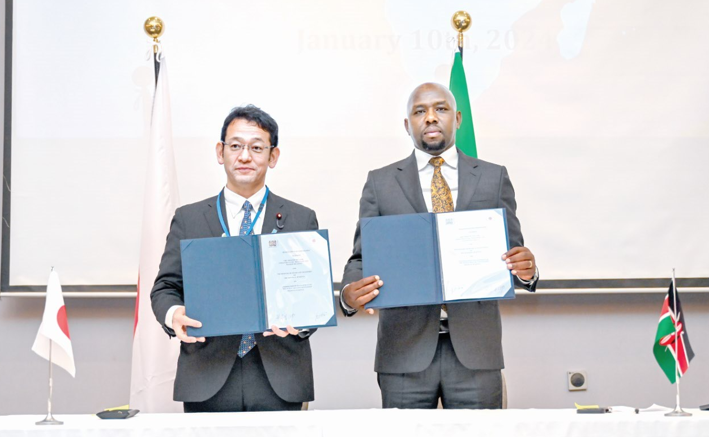Kenya, Japan collaborate to improve road infrastructure
By Barack Oduor, January 11, 2024Kenya and Japan have entered an agreement that will see them work together in the expansion of infrastructure as part of President William Ruto’s development plan.
Transport Cabinet Secretary Kipchumba Murkomen graced the Kenya-Japan Quality Infrastructure Conference that is meant to strengthen the partnerships between the public and private sectors in the two nations and to explore new infrastructure development opportunities, especially using the Public-Private Partnerships approach.
“The history of development cooperation between Japan and Kenya in the transport sector is rich in scope and depth. Japan has supported Kenya in undertaking technically difficult and resource-intensive development projects, such as building bridges in Nyali, Mtwapa, Kilifi and Sabaki,” said Murkomen.
This is the second time this gathering is being held in Kenya, with the first held in Nairobi in July 2015 and a follow-up one in May 2021 through the Quality Infrastructure Dialogue.
Representatives from Kenya’s road agencies attended the high level meeting together with their ministry of Water and Sanitation counterparts.
Murkomen noted that Japan’s assistance changed the face of Nairobi through the Nairobi Western Ring Roads project. He added that the refurbished Ngong Road is used by thousands of people every day and is a ringing endorsement of Japan’s commitment to quality infrastructure.
According to the CS, through the Mombasa Port Area Road Development Project, Japan has supported Kenya in the challenging and vital task of building a brand-new greenfield high-capacity transport corridor from Miritini to Mombasa Kipevu Port, and the even more difficult and resource-intensive task of designing and constructing a road link to the South Coast from Mombasa.
“On Tuesday the first few project vehicles crossed the final span of this new link and the South Coast area will never be the same again. Japan is also supporting the infrastructure and setting up of a Special Economic Zone, including new berths in Dongo Kundu in Mombasa,” explained Murkomen.
Numerous managers
He noted that Japan has also consistently supported human resource capacity building for Kenyans and, as we speak, numerous top managers in the transport sector can trace their past advanced training to courses in Japan.
“Japan has provided cost-effective capacity building by embedding long-term technical experts in the roads sector. These experts have left a lasting legacy, including the best road maintenance management skills and manuals in the region,” he added.
Japan State Minister for Lands, Infrastructure, Transport and Tourism Kokuba Konosuke said Japan is fully committed to helping Kenya realise its infrastructural goals.
“We are ready to work with Kenya so that it achieves its infrastructural goals. Our commitment has been unwavering for decades,” he said.
The government is also banking on its cooperation with Japan to reorganise and decongest Nairobi.
According to the Roads ministry, rapid traffic increase due to population growth and inefficient traffic system caused by unconnected ring road networks have not been sufficiently addressed, resulting in serious traffic congestion, accidents and pollution.
It is therefore urgently necessary to develop proper road networks and maintenance systems to respond to rapid urbanisation of Nairobi with an estimated population growth from 3.0 to 4.3 million by 2025.
The government is also eying to improve infrastructure around ports. Murkomen yesterday noted that Mombasa Port and international trunk roads starting from the Port are important for securing transportation to neighbouring landlocked countries like Uganda, Rwanda and Burundi.
Japan will assist not only hard infrastructure development but also technical aspects such as support for smooth custom clearance, and the entire maintenance and management of developed infrastructure.
